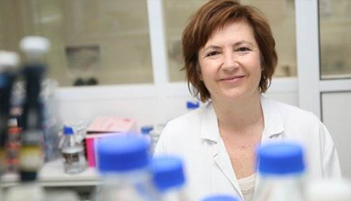
INRA Toxalim
France
Deputy Head of the research center on food Toxicology and Head of the Neuro-Gastroenterology & Nutrition Group – Toxalim UMR 1331 INRA/INPT/ENVT/UPS – Vassilia is Professor of animal physiology and Nutrition at the EI-Purpan (Ecole d’Ingénieurs de Purpan) and Researcher in the field of gut pathophysiology and pharmacology. Her current research interest is the microbiota-brain-gut axis: role in the regulation of the integrity and functionality of the intestinal barrier function and associated pathophysiology consequences (gut inflammation, food allergy/tolerance, visceral pain…). Vassilia developed concepts of proofs concerning the crucial role of the intestinal barrier integrity in the homeostasis of the brain functions and promotes the idea that food or pharmacological strategies aimed at preventing intestinal barrier function impairment contribute to the human welfare. Based on this background she is also an international consultant in the food industry and pharmaceutical companies.
The brain-gut axis can be defined as an integrated bidirectional entero-cortical activity. The regulation of the brain-gut axis is essential for maintaining gut but also central nervous system homeostasis. Striking and pioneer experimental evidence illustrating the role of the brain-gut axis in the regulation of the digestive functions include the Pavlovian conditioning on the gastric acid secretion, the stress-induced colonic transit acceleration and the changes in gut motility induced by centrally administered gut hormones. More recently, a new actor integrated the brain-gut axis, namely the intestinal microbiota. The rationale of this integration comes from experimental data showing that descending information from the brain is able to modify gut motility and intestinal barrier function, leading to changes of the commensals habitat resulting into alterations of their composition and metabolic profile. Conversely, the microbiota-host interactions can influence the intestinal barrier function resulting in the modulation of neural afferent pathways able to modulate the enteric nervous system, spinal and supraspinal neurochemistry. Further, recent literature reported that microorganisms, commensals or probiotics, are able to produce and deliver neuroactive substances (gamma-aminobutyric acid) or regulate host synthesis of such compounds (serotonin), which act on the gut-brain axis. Psychological stress is an environmental factor perfectly illustrating the bidirectional microbiota-gut-brain interplay. For instance, concerning the brain-gut descending pathway, stress induces intestinal barrier function impairment, visceral pain, and gut microbiota dysbiosis. Concerning the gut-brain ascending pathway, prevention of the gut “leakiness” attenuates the hypothalamic-pituitary axis (HPA) response to stress.
It suggests that modulation of the gut microbiota by probiotics and prebiotics may contribute to the restoration of a dysfunctional microbiota-gut-brain axis and improvement of gut “leakiness” associated with stress-related disorders.
